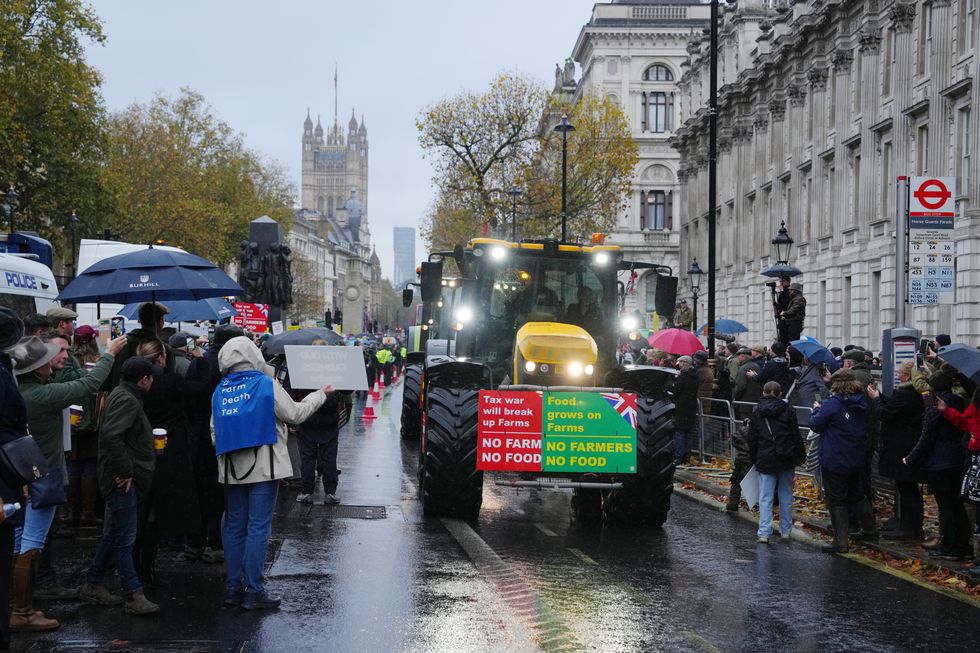Experts have brutally dismantled the Treasury’s defence of Chancellor Reeves’ farm tax calling it ‘not remotely representative’ and attacking its premise as ‘something that will never happen’.
Since Reeves announced she was slapping farmers with 20 per cent death duties on assets over £1million in her budget a huge row about how many farms will be affected has raged.
The Treasury argues it will only be 500 of the wealthiest farms, doggedly clinging to analysis of inheritance tax relief claims made under the Agricultural Property Relief (APR) scheme in 2021.
But industry experts have delivered a hammer blow to this defence, exposing its massive over-reliance on one year of data and its failure to analyse the state of farms on the ground, not on a spreadsheet from 2021.
Jeremy Moody, a leading figure in the farming industry, argued the Treasury’s 500 figure is next to pointless in a brutal three-part takedown.
He said: “I think almost nobody who is closely involved in this feels that the government’s figure is remotely representative of what we feel from practice in the field.
“Firstly, there are many people in farming who are making Business Property Relief (BPR) only claims.
“This includes tenanted businesses, family farming companies, and people who don’t have a farmhouse and just have machinery, livestock and the rest.”
As these are business assets, to hand them down to the next generation a farmer would claim relief from inheritance tax under BPR, not the headline grabbing Agricultural Property Relief (APR).
The Treasury’s figures only apply to APR claims however, meaning the true number of farms affected will be underestimated.

Farmers protesting in London on December 11
Getty
Moody continued: “The second issue is that BPR claims dramatically underestimate the value of a business.
“For a dairy herd, it could be understated by 70 or more percent. That’s a very significant uplift when you think about the value of cattle at £1800-£2200 an animal.”
Again, if the true value of business assets had been taken into account in the Treasury’s analysis, the number of farms affected would be much higher.
Thirdly, Moody highlighted the fact that under current rules spouses are able to transfer farms and assets tax free, but under proposed rules there would need to be a claim made under APR for this.
Moody said: “This will create APR claims out of what were previously spouse transfers.
“These are APR claims that don’t currently exist, so therefore can’t have featured in the Treasury’s formulating of the 500 figure.”
Moody finished his attack on the Treasury’s figures by taking aim at the fact they were based on just one year’s worth of claims.
“We don’t think a figure in a year is relevant. It’s rather saying to the people who die in 2027 that they don’t matter.
“Looking at it over a generation, say 30 years, and you could argue for a longer period and probably not a shorter period, but to take a conventional 30-year period, we think 75,000 farming taxpayers will be affected.”
LATEST FROM MEMBERSHIP:
- EXPOSED: Unbelievable graph shows amount of fuel ‘green’ Starmer has burnt jet setting across world
- REVEALED: The Labour MPs selling out fishing communities if Starmer buckles to EU in Brexit betrayal
- Starmer is setting up Brexit ‘surrender squad’ and ensuring Reform can’t undo it – Kelvin MacKenzie
Shortly after Moody’s speech, Stuart Maggs, a partner at the leading legal firm Howes Percival LLP, weighed in against the Treasury.
Maggs said: “The real issue is what does ‘affected’ mean.
“What the Treasury have done is said ‘if we picked this hypothetical set of rules we’ve come up with and applied it to data from 2021, how many people would have paid some tax in those circumstances.
“That will never happen in the real world.
“What they should have done was look at how many people are going to be waking up and thinking ‘am I going to lose my farm if my father dies’.
“That’s much more likely to be about 75,000 farms once you’ve run the numbers.”
Responding, a government spokesperson said: “Our commitment to farmers remains steadfast – we have committed £5 billion to the farming budget over two years, including more money than ever for sustainable food production, and we are developing a 25-year farming roadmap, focusing on how to make the sector more profitable in the decades to come.
“Our reform to Agricultural and Business Property Relief will impact around 500 estates a year.
“For these estates, inheritance tax will be at half the rate paid by others, with 10 years to pay the liability back interest free. This is a fair and balanced approach which fixes the public services we all rely on.”